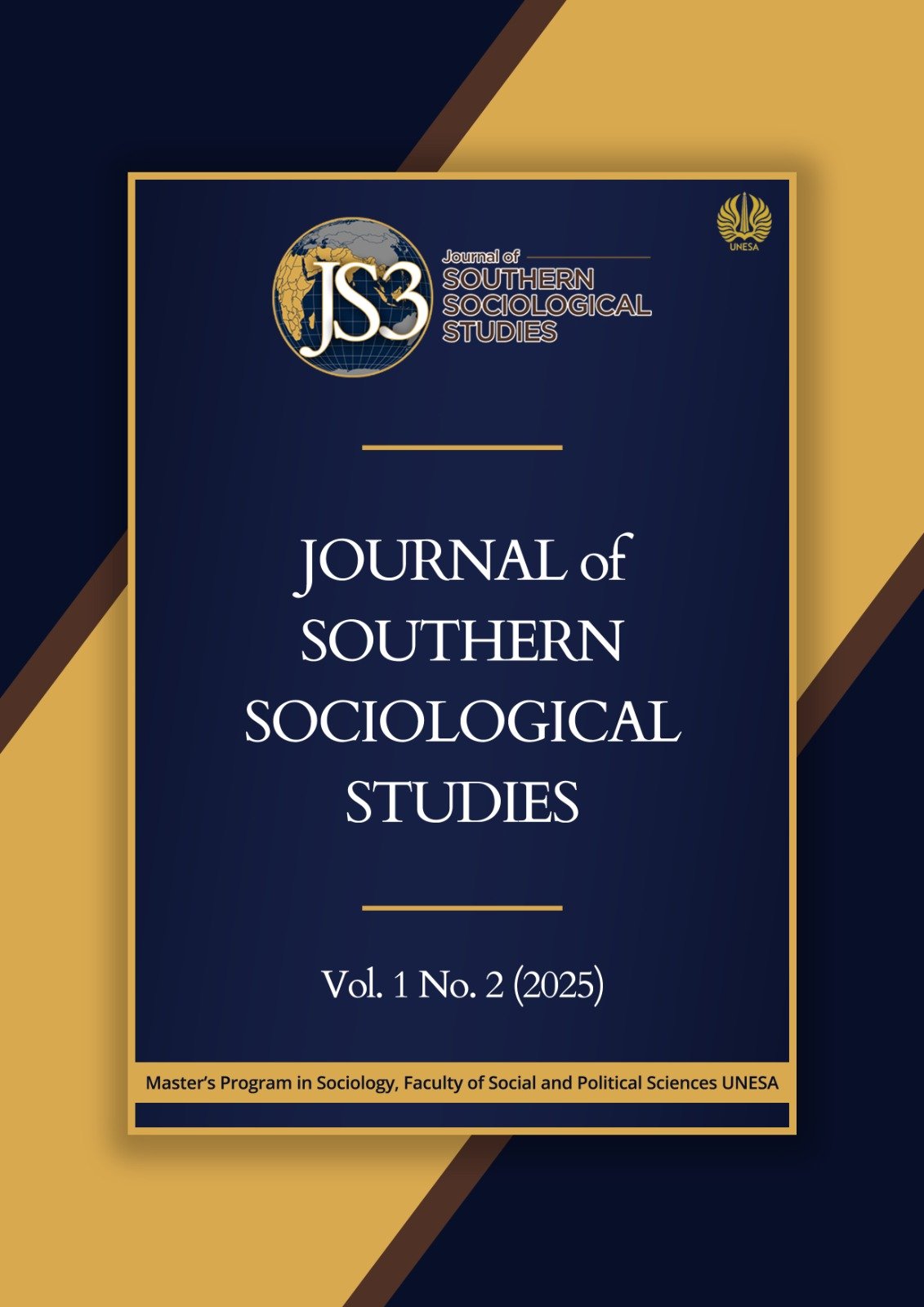The Digital Da'wah (Preachers) and Hegemony in Digital Age
A study of Muslim Generations’ Political Preferences by Social Media
DOI:
https://doi.org/10.26740/jsss.v1i2.40520Keywords:
digital da’wah (preachers), hegemony, social media, political preference, digital generationAbstract
This study explores how digital da’wah influences the political preferences of Indonesia’s Muslim digital generation. Employing a qualitative case study approach, data were collected through in-depth interviews with Muslim university students aged 18–25 who actively consume religious content on platforms such as TikTok, YouTube, and Instagram. The findings reveal that digital preachers function as ideological agents who frame political choices as part of religious and moral obligations. The use of social media algorithms intensifies exposure to specific narratives, resulting in echo chambers that narrow perspectives and increase polarization. Using Antonio Gramsci’s theory of hegemony, the study highlights how ideological power is constructed and sustained through cultural consent and religious authority. However, the study also identifies critical audience responses that challenge dominant narratives, demonstrating that digital da’wah is not hegemonically total. This research underscores the importance of digital literacy and a more dialogical approach to online religious preaching as a way to foster healthy and inclusive political participation in the digital age.
References
Aditoni, Agus, and Zuliati Rohmah. 2022. “Campus-Based Millennials’ Learning Preferences Toward Da’wah in Urban City of Surabaya.” Journal of Indonesian Islam 16(1):27–48. https://doi.org/10.15642/JIIS.2022.16.1.27-48
Ahyar, Muzayyin, and Alfitri. 2019. “Aksi Bela Islam: Islamic Clicktivism and the New Authority of Religious Propaganda in the Millennial Age Indonesia.” Indonesian Journal of Islam and Muslim Societies 9(1):1–29. https://doi.org/10.18326/ijims.v9i1 .
Alwi, Engku. 2024. “Da’wah Strategy in the Digital Era.” Proceedings of International Conference on Da’wa and Communication 6.
Badrah Uyuni, Mu’allimah Rodhiyana, and Syarifah Soraya. 2023. “The Potential of Daiyah (Woman Religious Preachers) to Harness the Power of Religious Preaching on Social Media.” Jurnal Bina Ummat: Membina dan Membentengi Ummat 6(2):167–182. https://doi.org/10.38214/jurnalbinaummatstidnatsir.v6i2.256
Bossetta, Michael, and Rasmus Schmøkel. 2022. “Cross-Platform Emotions and Audience Engagement in Social Media Political Campaigning.” Political Communication. https://doi.org/10.1080/10584609.2022.2128949.
Briandana, Rizki, Caturida Shahir, and Wan. 2020. “Da’wah Communication and Social Media: The Interpretation of Millennials in Southeast Asia.” International Journal of Economics and Business Administration 8(Special Issue 1):216–226. https://doi.org/10.35808/ijeba/543
Childers, Courtney, and Brandon Boatwright. 2021. “Do Digital Natives Recognize Digital Influence?” Journal of Current Issues and Research in Advertising 42(4):425–442. https://doi.org/10.1080/10641734.2020.1830893.
Dean, Jonathan. 2024. “From Solidarity to Self-Promotion? Neoliberalism and Left Politics in the Age of the Social Media Influencer.” Capital & Class 48(4):519–541. https://doi.org/10.1177/03098168231199907.
Estuningtyas, Retna Dwi, Abdul Hamid, Siti Nuri Nurhaidah, and Zamakhsyari Abdul Majid. 2023. “The Role of the Millennial Generation in Da’wah Journalism in the Digital Age.” Jurnal Syntax Transformation 4(7):35–45. https://doi.org/10.46799/jst.v4i7.758.
Falach, Ghulam. 2025. “Analysis of Religious Moderation Messages for Generation Z in Gus Baha’s Da’wah on Youtube.” Jurnal Komunikasi Islam (J-KIs) 6(1). https://doi.org/10.53429/j-kis.v6i1.1200.
Hakim, Lukman, and Ikhsan Hakim. 2024. “Preferences and Behaviour of Gen Z Voters in the 2024 Indonesian Presidential Election.” Jurnal Aristo (Social, Politic, Humaniora) 12(3):796–807.
Hamidah, Kamilia. 2023. “Seizing Public Digital Dominance: The Phenomenon of Mainstream Islamic Media Digital Battle.” Mu’ashir: Jurnal Dakwah dan Komunikasi Islam 1(1):1–12. https://doi.org/10.35878/muashir.v1i1.749.
Hansson, Eva, and Meredith L. Weiss. 2023. Routledge Handbook of Civil and Uncivil Society in Southeast Asia. London: Routledge.
Ibtida Saumi, Rahma, Surawan, and Hesty Widiastuty. 2024. “Patrick Star as a Modern Islamic Da’wah Medium in the Perspective of Gen Z Muslim Men and Women.” International Proceedings Universitas Tulungagung.
Jaili, Hambali, Yusria Ningsih, and UIN Sunan Ampel Surabaya. 2024. “Interactive Preaching to Youth Through Social Media: The Perspective of Brunei Darussalam.” Proceedings of International Conference on Da’wa Management & Engagement 1(2).
Khotimah, Nurul, Ilyas Supena, Nasihun Amin, Pandika Adi Putra, and Ari Setyawan. 2024. “Analysis of Digital Da’wah Ideology on Social Media.” Ilmu Dakwah: Academic Journal for Homiletic Studies 18(2):283–302. https://doi.org/10.15575/idajhs.v18i2.33698.
Mohammed Bilal, Shaikh, Zafiya Mallick, Jignesh Vidani, and Shaikh Mohammed Bilal. 2024. “Gen Z’s Perception on Shaping Public Opinion Through Social Media Post in Ahmedabad City.” International Journal of Integrative Research (IJIR) 2(11):861–880. https://doi.org/10.59890/975h2842.
Muvid, Muhamad Basyrul, Didiet Anindita Arnandy, and Achmad Arrosyidi. 2024. “TikTok Social Media: A Breakthrough to the Moderation in Da’wah Education.” AL-ISHLAH: Jurnal Pendidikan 16(2):1193–1204. https://doi.org/10.35445/alishlah.v16i2.4727.
Muyassaroh, Inas Sany, Unggul Sugi Harto, and Diryo Suparto. 2023. “Analyzing the Preacher Communication Model on Social Media Content.” International Journal of Sustainable Development & Future Society 1(2):46–51. https://doi.org/10.62157/ijsdfs.v1i2.39.
Nuriana, Zulfa Ilma, and Nisrina Salwa. 2024. “Digital Da’wah in the Age of Algorithm.” Sinergi International Journal of Islamic Studies 4(2). https://journal.sinergi.or.id/.
Ohme, Jakob. 2021. “Algorithmic Social Media Use and Its Relationship to Attitude Reinforcement.” Journal of Information Technology and Politics 18(1):36–54. https://doi.org/10.1080/19331681.2020.1805085.
Pérez-Escoda, Ana, Luis Miguel Pedrero-Esteban, Juana Rubio-Romero, and Carlos Jiménez-Narros. 2021. “Fake News Reaching Young People on Social Networks.” Publications 9(2):24. https://doi.org/10.3390/publications9020024.
Robin, Patricia, Silvanus Alvin, and Tesalonika Hasugian. 2022. “Gen-Z Perspective on Politics.” Jurnal Ilmu Sosial dan Ilmu Politik (JISIP) 11(3):183–189. https://doi.org/10.33366/jisip.v11i3.2550.
Romadlany, Z., and M. Effendi. 2025. “An Examination of Social Media as a Medium for Islamic Da’wah.” Journal of Educational Management Research 4(3):754–765. https://doi.org/10.61987/jemr.v4i3.1002.
Saleh, Sadhriany Pertiwi, Hafied Cangara, Safiyyah Sabreen, and Syamsuddin Ab. 2022. “Digital Da’wah Transformation.” International Journal of Multidisciplinary Research and Analysis 5(8). https://doi.org/10.47191/ijmra/v5-i8-18.
Seyfi, Siamak, Mohammad Sharifi-Tehrani, C. Michael Hall, and Tan Vo-Thanh. 2025. “Exploring the Drivers of Gen Z Tourists’ Buycott Behaviour.” Journal of Sustainable Tourism 33(6):1146–1164. https://doi.org/10.1080/09669582.2023.2166517.
Siagian, Haidir Fitra, Mashadi, and Amirsyah. 2024. “Exploring Ulama’s Political Messages in Digital Media Sermons.” ICAIS: International Conference on Actual Islamic Studies 3(1).
Usman, Usman, Amirsyah Amirsyah, and Haidir Fitra Siagian. 2024. “University Students’ Engagement with Ulamas’ Political Messages on Social Media.” Jurnal Komunikasi: Malaysian Journal of Communication 40(2):310–327. https://doi.org/10.17576/JKMJC-2024-4002-18.
Usman, Usman, and Haidir Fitra Siagian. 2024. “Indonesian Younger Generation’s Acceptance of Digital Da’wah.” Jurnal Dakwah Risalah 35(1):1. https://doi.org/10.24014/jdr.v35i1.28975.
Wina Sumiati, and Taosyekh Nawawi. 2025. “Digital Da’wah in the Modern Era.” Digital Muslim Review 2(2):153–175. https://doi.org/10.32678/dmr.v2i2.44
Downloads
Published
How to Cite
Issue
Section
 Abstract views: 270
,
Abstract views: 270
, PDF Downloads: 232
PDF Downloads: 232





